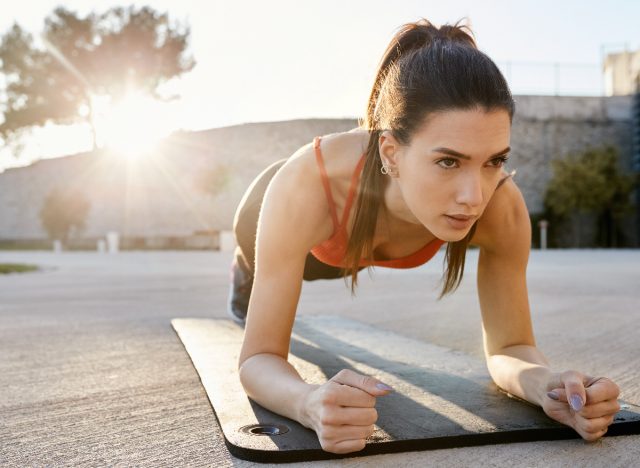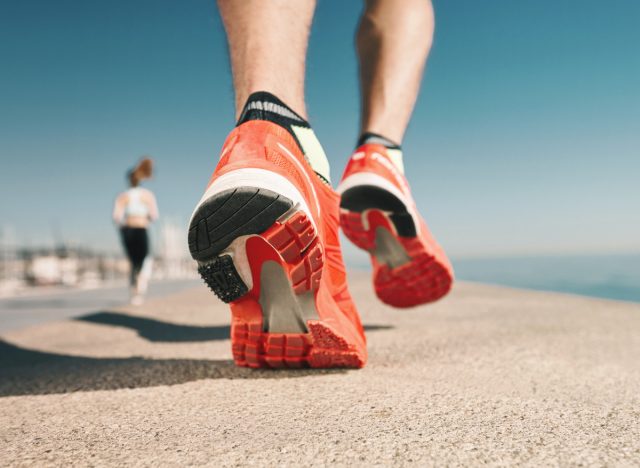5 Detrimental Running Mistakes That Kill Your Knees, Trainer Reveals

If you’re a runner, you likely have your cardio routine down pat. To ensure you stay at the top of your game and in good health while you’re getting in those strides, we chatted with Stephanie Thomas, a personal trainer on Fyt, who shares some super common, yet detrimental running mistakes that kill your knees. (For those of you who didn’t know, Fyt is the biggest personal training service in the nation that makes expert-guided fitness—whether virtual or in-person—convenient and accessible for everyone.)
It doesn’t matter if you’re just kicking off your running journey or you’ve been doing it for years now; any runner can suffer from an injury. According to the Berkshire Independent Hospital, the most common joint to endure injury from running is the knee. If the structures in and out of your knee joint are impaired, you could have a sprain, dislocation, fracture, or tear on your hands. Runner’s knee, which is when you experience pain in your kneecap or patella, is the most common condition runners deal with. You’ll notice it when you run and are experiencing pain surrounding your knees.
Quitting any bad habits and keeping up with good ones that’ll boost your performance and help you avoid pain is key. So without further delay, Thomas reveals the running mistakes that kill your knees. Keep reading to learn more so that you can address them ASAP.
You’re not focusing enough on strength training.

A super common, yet harmful runner’s error is not performing strength training along with your cardio sessions. Strength training is imperative to help build and preserve lean muscle mass as you age, considering you lose 3% to 5% of it every 10 years after turning 30 (via Harvard Health Publishing). So don’t skip it!
“If you don’t incorporate strength training workouts, you may experience muscle imbalances, which can cause issues like runner’s knee, resulting in achy and painful knees,” Thomas explains. If you want to become a stronger runner, you need to train your whole body. Thomas suggests incorporating two to three days of full-body strength workouts into your weekly rotation.
Related: What Running Every Day Does to Your Body, Expert Reveals
You’re not using correct form.

If you’re running with incorrect form, you’ll likely suffer from knee pain. You might be putting a substantial amount of pressure on your knees if you’re not being mindful of your form and letting your knees over-stride or cave in. This can also occur if you don’t activate your glutes and core, which could lead to injury or pain down the road.
What does Thomas suggest? Have someone record a minute-long video of you running so you can study your form and see where necessary improvements can be made. Be mindful of good running techniques and cues the next time you hit the pavement. “Once you correct your running form,” Thomas says, “you’ll realize that proper running form is key to making running feel enjoyable and ‘easy.'”
Related: Avoid These 6 Things That Age You Faster Than You Should, Expert Says
You’re not stretching enough.

Stretching is so crucial to a runner’s performance, yet many runners don’t do it enough. According to Harvard Health Publishing, stretching ensures your muscles stay strong, healthy, and flexible, which is necessary for preserving your range of motion. If you don’t stretch, your muscles can become tight and short. When it comes time to put those muscles to work, they’re weak and won’t be able to extend to the best of their ability.
Thomas suggests stretching a minimum of five minutes before heading out for a run. “If your muscles become too tight as a result of running, you may be more likely to experience injury,” she explains, adding, “To keep your knees safe, it’s especially important to stretch your hip flexors, quadriceps, and hamstrings.”
You’re not wearing good running shoes.

Another one of the top running mistakes that kill your knees? Your sneakers could be to blame! It’s important to get properly fitted for your running shoes. If you’re taking strides in shoes that don’t fit correctly, you can experience knee pain and will likely use incorrect running form.
“Old shoes often lose their cushioning and support, so don’t feel bad for ditching your old pair of shoes,” Thomas says, adding, “It’s so important to invest in a quality pair of running shoes. Get fitted by a professional at your local running store. You won’t regret it!”
You’re bumping up your mileage too fast and pushing your body too hard.

According to Thomas, increasing your mileage too fast while running is a major no-no. This can put a lot of pressure on your knees, which could result in pain or soreness. “As with any physical activity,” Thomas explains, “you want to increase the intensity and duration of the exercise gradually. Increase your mileage little by little each week to keep your joints and muscles happy.”
Make absolutely sure you’re not pushing yourself too hard; if you are, you’ll have to scale back. When you’re overtraining, you may experience moodiness, muscle tiredness, mental fatigue, body aches and pains, restlessness, poor quality of sleep, and a higher resting heart rate.
Thomas explains you’ll know you need to seek the help of a medical professional or physical therapist if your pain is interfering with your daily responsibilities, you’re dealing with true pain and not only soreness, the pain returns when you exercise (even after resting for a good chunk of time), the pain is constant, you can’t perform mobility exercises without experiencing pain, and overall you feel like something’s off.








